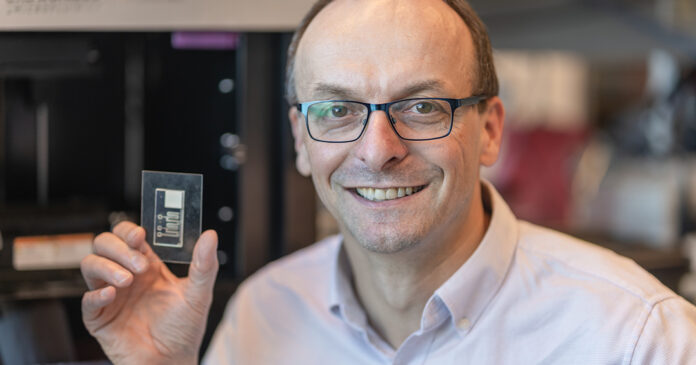McGill researchers demonstrate potential for on-the-spot 3D-printed tests.
McGill University researchers have made a breakthrough in diagnostic technology, inventing a ‘lab on a chip’ that can be 3D-printed in just 30 minutes. The chip has the potential to make on-the-spot testing widely accessible.
As part of a recent study, the results of which were published in the journal Advanced Materials, the McGill team developed capillaric chips that act as miniature laboratories. Unlike other computer microprocessors, these chips are single-use and require no external power source – a simple paper strip suffices. They function through capillary action – the very phenomena by which a spilled liquid on the kitchen table spontaneously wicks into the paper towel used to wipe it up.
“Traditional diagnostics require peripherals, while ours can circumvent them. Our diagnostics are a bit what the cell phone was to traditional desktop computers that required a separate monitor, keyboard and power supply to operate,” explains Prof. David Juncker, Chair of the Department of Biomedical Engineering at McGill and senior author on the study.
At-home testing became crucial during the COVID-19 pandemic. But rapid tests have limited availability and can only drive one liquid across the strip, meaning most diagnostics are still done in central labs. Notably, the capillaric chips can be 3D-printed for various tests, including COVID-19 antibody quantification.
The study brings 3D-printed home diagnostics one step closer to reality, though some challenges remain, such as regulatory approvals and securing necessary test materials. The team is actively working to make their technology more accessible, adapting it for use with affordable 3D printers. The innovation aims to speed up diagnoses, enhance patient care, and usher in a new era of accessible testing.
“This advancement has the capacity to empower individuals, researchers, and industries to explore new possibilities and applications in a more cost-effective and user-friendly manner,” says Prof. Juncker. “This innovation also holds the potential to eventually empower health professionals with the ability to rapidly create tailored solutions for specific needs right at the point-of-care.”




